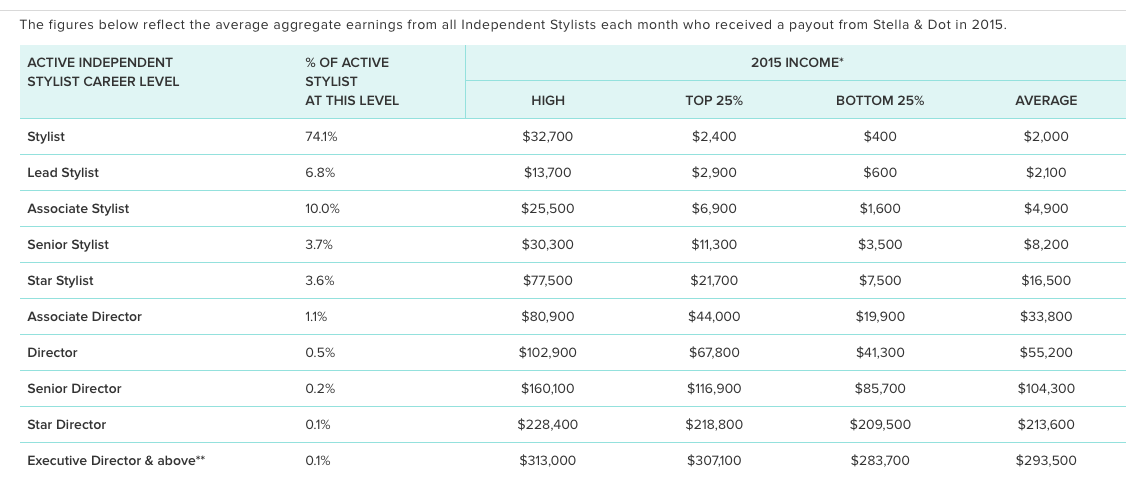The four questions you need to ask before joining an MLM
Been approached by an MLM rep with a fantastic income opportunity and considering joining? Make sure you ask these four questions first.
If you’re looking for a way to make a bit of money on the side (and have fun in the process), or even swap your job for the opportunity to make a living working for yourself from home, MLMs can seem very appealing.
But, according to their own income disclosure statements, it appears that many people who work for MLMs earn very little money – if any at all. In fact, a major study into 11 MLMs discovered that “…on average, 99% of all participants received less than $10 a week in commissions, before all expenses“.
So what do you believe? The marketing messages from MLMs, and the stories you’re hearing from your rep seem so tempting, and you’d desperately love for them to be true.
Over the past few weeks we’ve been investigating how MLMs work and speaking to some of the world’s top experts in them. And as a result we’ve put together four questions we recommend you ask before investing your time and money in an MLM, social selling, network marketing or direct selling company.
Want a deeper dive into MLMs? We recommend reading: Are MLMs pyramid schemes? And other questions you need to ask before joining one
1) What’s your rep churn rate?
Basically, this question means ‘how many representatives leave your business every year’? Most MLMs have quite a high proportion of reps who leave every year, possibly because they find it so hard to make money from it.
Herbalife, for example, apparently has an annual turnover of 90% of distributors who were not supervisors, and 60% of supervisors. So it’s important to know how many people leave the MLM you’re considering joining.
If you’re told that it’s normal for people to leave, because a high proportion of small businesses fail, compare your MLM’s churn rate to the real number of small businesses that close:
- A study by Ormsby Street found that 91% of small businesses are still trading after one year, and by five years’ time, six in ten are still trading.
- This tallies with research by RBS that found that around half of small businesses fail within five years.
So, if your MLM is in line with small businesses, you’d expect around only 10-20% to leave each year. If the number is higher, you have to ask yourself why that is. Could it be that the ‘income opportunity’ doesn’t work for most people who join?
And if it is that high and you’d really love to work for yourself, perhaps you’d have a higher chance of success by starting your own business properly?
2) Can I see your income disclosure statement?
Some MLMs produce income disclosure statements in which they show how much they pay each level of representative in the company on average a year. Here’s one for Stella&Dot:

And here’s one for Arbonne:

These are important documents because they give you a realistic idea of what you can potentially earn at each level of the company. For example, in Stella&Dot’s income disclosure statement for Canada in 2015, they state:
“The typical stylist (including inactives) during 2015 earned between $0 to $100…”
(We look into Stella&Dot’s income disclosure statement in more detail here and find out why, according to a top MLM expert “the average profit is zero” at Arbonne.)
We would always advise seeing an income disclosure statement (a formal one from the company, not the personal experience of your rep) before investing time or money in joining an MLM – and analysing it carefully.
In most cases the commission they list paying out doesn’t include expenses, or reps who earned no commission in any given month (it will usually tell you this in the small print).
If the company you’re thinking of joining doesn’t produce income disclosure statements (many MLMs don’t) you have to ask yourself why not. What have they got to hide? If the opportunity they’re offering you is as good as you may believe it is, why don’t they advertise that with actual, factual figures?
It’s also worth digging into their fine print. Valentus, for example, has a Policies and Procedures document that reveals that:
“Most Independent Representatives earn less money each month in the compensation program than they are paying for their products. Although it is possible, Valentus Independent Representatives should NOT expect to make a profit simply by becoming an Independent Representative, as it is very possible that will not occur.”
Yes, you have read that correctly. They do admit that most of their reps earn LESS every month than they are paying for their products. Funnily enough this fact isn’t publicised on their recruitment pages.
This is proof of the importance of looking into the small print and not just taking the work of a ‘friend’ or acquaintance who needs you to join their team because they’ll make money from you. (As we share here, some MLM reps will happily lie to recruit and sell.)
Personally we would never join an MLM or social selling company without first seeing and analysing their income disclosure statement AND poring through their T&Cs.
Would you join a company without knowing what salary you’d get paid? Or start a business without conducting a cash-flow forecast?
3) What structures do you have in place to prevent saturation?
Imagine opening a bakery in a village that already had 10 established bakeries, and trying to sell exactly the same products for the same prices. How successful do you think you’d be?
This is just one reason why some people fail at MLMs – they’re trying to sell identical products in an already saturated market.
So before you pay for a starter kit to join an MLM, ask them what structures they have in place to prevent this happening. Do they restrict the number of reps in any given geographical area (a practice that used to happen many decades ago in the early years of direct selling)? If not, ask how many reps are already in your area (the company will know this as they’ll have their addresses on record).
Not worried because you’re going to sell to your social circle or online social network? Again, honestly consider how may of them will:
- Want to buy and be able to afford your products.
- Be able to buy regularly enough to give you the commission you want to earn.
- Have already heard about or be buying these or similar products from someone else.
If you were starting your own small business, some of the most important first steps would be to establish you had a market that was big enough to sustain you, check your pricing against other products or services available to customers, and research your competition.
In a MLM, you’re not just in competition with other products and brands, you’re in competition with other reps working for the same company as you – including the person who recruits you! That’s why it’s so important to ensure you genuinely have a large enough market who want what you’re selling and aren’t able to buy from anyone else before you sign up.
So DO make sure the company you’re thinking of joining has structures in place to prevent saturation. Don’t just allow them to palm you off by telling you the products ‘sell themselves’.
And if they tell you the money is in recruitment and building a team, then you are joining a blatant pyramid scheme and should run in the opposite direction as fast as you can.
4) What structures do you have in place to prevent signing up people who can’t sell?
If you want to work at a company, you’ll usually submit an application form and your CV. If you’re suitable on paper you’ll be invited in for an interview. And if you pass that you’re hired – but only if there is a position available for you.
It doesn’t seem to work this way with MLMs. You’ll either have been approached by (or approached) a rep directly, or applied via the MLM’s website and been put in touch with a local rep.
The problem is that the rep who is signing you up you will most probably financially benefit from you joining. And this causes a conflict of interest. If the rep is ethical and it is clear to them you probably won’t succeed – either because they know your area is already saturated or you don’t have the right attributes to sell MLM (not everyone does) – they’ll talk you out of it.
But what if they’re not ethical? If you sign up, they get another person in their downline. That usually means they earn a percentage of everything you sell, and your expenses too, such as your starter kit.
In our opinion, companies have a responsibility to ensure that vulnerable people, or people who don’t stand a chance of genuinely making a go of the opportunity, aren’t signed up. That they don’t invest money and time in something doomed to failure.
So before you commit yourself to an MLM, ask what structures the business has in place to ensure that it’s is only taking on people who can make a go of it – just a company would only hire an employable candidate, and a bank would only lend money to a viable business.
If you join an MLM, go in with your eyes open
We hope these questions have helped enlighten you to some of the things you need to consider when joining an MLM.
We absolutely recommend asking all four of them – and if the company can’t or won’t answer them, then think carefully whether this is an opportunity you really want to explore, or will even deliver what you want.
If you decide to join an MLM with your eyes open, then that’s fine. But it could be an expensive lesson if you take a leap of faith, trusting promises made to you without arming yourself with the facts.
It might be long, but we also recommend reading this in-depth research, published by the Federal Trade Commission, before parting with a penny. It explains how the business model works, and why an average of 99.6% of people who join an MLM will lose money when business expenses are taken into account.
Personally we can’t believe anyone would touch this ‘income opportunity’ with a bargepole after reading this research.
Where can you read more about MLMS?
Whats the income opportunity in the MLM you’re thinking of joining like? You can read our investigations into individual MLMs here:
- Herbalife
- Arbonne
- Stella&Dot
- Younique
- MONAT
- Isagenix
- Nu Skin
- doTERRA
- Acti-Labs
- LuLaRoe
- Amway
- Usborne Books
- It Works
- Forever Living Products
- Juice Plus
- Tropic Skincare
- Valentus
You can also read more about the MLM industry in general in these articles:
- The 10 ugly truths MLMs don’t want you to know
- Is it REALLY possible to make money in an MLM? We do the sums
- Are MLMs really pyramid schemes? Why you can’t make money selling their products
- Seven lies an MLM rep will tell you – and the REAL truth you need to know
And if you’d like to learn more about the history of MLMs, and theories as to why the business model has been allowed to continue despite an average of 99.6% of participants losing money, we also recommend listening to the first series of The Dream podcast.
Photo by Ariel Lustre on Unsplash










